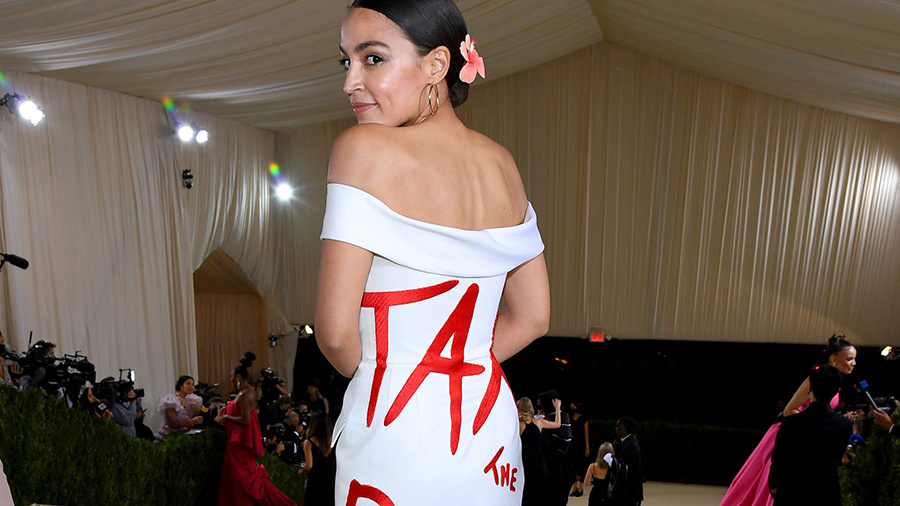Alexandria Ocasio-Cortez’s Met Gala dress blew-up the Internet last week. For a brief moment, the social- and conventional-media commentariat on the right and the left were able to agree on a matter of critical political import: The congresswoman’s Aurora James-designed white dress emblazoned with the slogan “Tax the rich” in huge red letters, was an abomination.
The reactions ranged mostly from “she’s an execrable commie troll” on the right, to “she’s an execrable political grandstander” on the left. In either case, the commentary focused almost exclusively on her body – you know: the thing that was wearing the dress. To some extent, this is inevitable, because the Met Gala is constructed as a very explicit display case of the female body, no matter how transgressive, and thus titillating, those performances might be. In this sense, it is the Victoria’s Secret “angels” show’s high-class doppelganger.
There was the usual political Puritanism about how a self-identified socialist (a member of the Democratic Socialists of America, no less) should not have been seen at the Met Gala, where tickets cost $30,000 per seat, and the atmosphere is vintage Hunger Games Capitol. On that, the Puritans with the white cockades on the right were, once again, in full agreement with the Puritans with the red cockades on the left in a veritable Royalist/Jacobin alliance. But that, predictably, ignored two important things:
First, Rep. Occasion-Cortez did not buy her own ticket (let alone out of her $174,000 Congressional salary). She was invited by the organizers and, let’s be let’s be honest, even Emma Goldman, who reportedly told Vladimir Lenin “If I can’t dance, I don’t want to be part of your revolution,” would’ve gone if she’d been invited.
Secondly, whatever you think of it, contemporary electoral politics demands media exposure, both in traditional media like television and newspapers, and in the new world of social media. For a politician to successfully advance their policies, they need to be where the cameras are, and they need to get the lenses and microphones pointed their way. This is a reality that successful politicians as different as Bernie Sanders and Donald Trump know better than anyone and it is a lesson that Rep. Ocasio-Cortez has learned well, judging from the way she dominated America’s social media feed last week.
Her slogan “tax the rich” is hardly a surprise; it has been the centerpiece of her political agenda since she first ran for Congress, but the text will be burned into our retinas long after the image of the dress itself has faded from our memory. Whatever else it was the congresswoman’s geste de la jupe was a masterful piece of sloganeering in an age when political interventions are measured in characters and pixels.
What is most striking about the whole incident, however, are the erotics of the commentary on Rep. Ocasio-Cortez’s dress and body – they are identical in this instance – and what it reveals of our politics and media. It is the congresswoman’s misfortune to be a young woman with considerable cultural and political capital in America, and this inevitably places her in an erotically-charged position with regard to both the right and the left.
For the commentators on the right, using her body to display the slogan “tax the rich” in a social context where she should be submissive and sexually receptive – that is, wearing a pretty dress – was one transgression too far. Rep. Ocasio-Cortez subverted what they regard as her only acceptable value: as a sexual object. Ultimately, the right’s pervasive, creepy obsessiveness about the congresswoman is essentially libidinal.
For the left – and it is worth noting that virtually all of her critics on the left were heterosexual men – the issue was much the same; only, her offense is that she has not restrained her body sufficiently in making what is really a fairly anodyne political statement. There is so much conflict here that speaks to the erotics of the left. George Orwell noted this in 1984, when he described Winston Smith’s reaction to Julia, upon seeing her in the uniform of the Junior Anti-Sex League: “His first feeling was relief, but as he watched the strong slender body moving in front of him, with the scarlet sash that was just tight enough to bring out the curve of her hips, the sense of his own inferiority was heavy upon him.”
There is, as always, a demand that some elements of the left – primarily white, heterosexual men entranced by the myths of revolutionary masculinity – place on women for physical and erotic abnegation and submission that is not essentially different from the erotics of the right. In either case, when their desire is deflected by a public figure like AOC performing insufficiently feminine/compliant, or excessively feminine/non-compliant, they explode into rage and frustration, like the J. Geils Band singing “Centerfold.”

